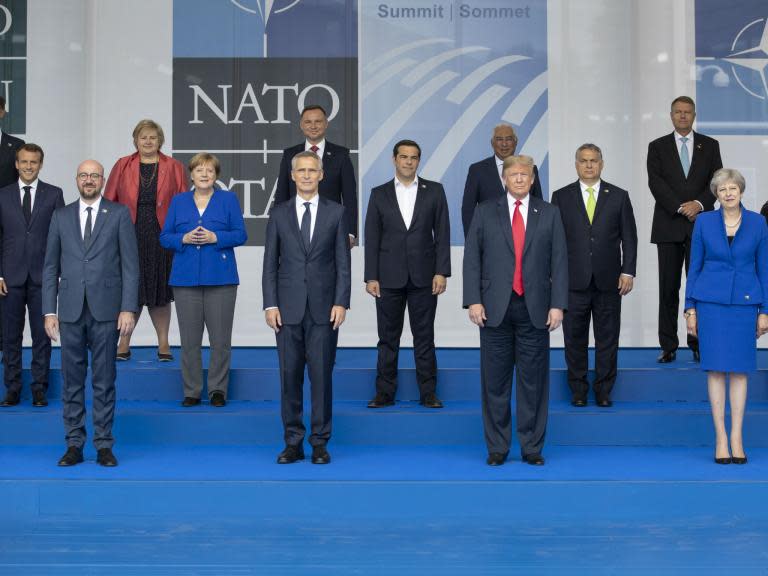Trump-Nato summit: US president antagonises allies with call to double defence spending
Donald Trump arrived at the Nato summit in Brussels in full assault mode and started his tirade early, berating Germany for supposedly being “totally controlled” by Russia and accusing the alliance as a whole of being “delinquent” for depending on the US to pay the lion’s share of the defence budget.
The US president then raised the ante by insisting that Nato countries should double the 2 per cent of their budget spent on defence to 4 per cent. The demand came despite the fact the United States itself spends 3.5 per cent of its budget on defence.
In a statement, White House spokeswoman Sarah Sanders said: “The president raised this same issue when he was at Nato last year. President Trump wants to see our allies share more of the burden and at a very minimum meet their already stated obligations.”
The 4 per cent target is unlikely to be met by any of the member states in the near future, with just 15 members, just over half, meeting the 2 per cent benchmark by 2024 on current trends. To some European diplomats the call for doubling it was another example of Mr Trump continuing with a confrontational stance towards Nato.
The Nato secretary-general, Jens Stoltenberg, declined to answer questions about Mr Trump’s remarks, saying: “I think we should first get to 2 per cent, focus on that now... the good thing is that we are moving to that.”
Heiko Maas, the German foreign minister, stated pointedly: “Our budget is determined by the German Bundestag... The decisions that we have to make, how much money will be spent, is a decision that we make autonomously – that’s made by the German Bundestag.”
Mr Maas’s response was the latest round in an acrimonious exchange between Mr Trump and the German government, which had begun when, during his first meeting on arrival at the Nato summit, he berated Germany for being supposedly “totally controlled” by, and becoming “ a captive” of, Russia in his very first meeting.
The Kremlin captivity, according to the US President, came from Germany’s role in the transport of Russian gas to Western Europe. He appeared to be referring to the Nord Stream 2 pipeline, which will bring gas from Russia to Germany’s Baltic coast when it is completed.
Some of Mr Trump’s assertions, unsurprisingly, were incorrect. He claimed that “Germany is getting 60 to 70 per cent of their energy from Russia and a new pipeline”, when in reality around 20 per cent of German energy use is from oil and gas imports from Russia.
Angela Merkel, arriving later at the summit, declared that Germany will determine its own national policies. The German chancellor, who grew up in East Germany, said: “I’ve experienced myself a part of Germany controlled by the Soviet Union and I’m very happy today that we are united in freedom as the Federal Republic of Germany and can thus say that we can determine our own policies and make our own decisions, and that’s very good.” The foreign minister Mr Maas added: “We are not captive, neither to Russia nor to the USA. We’re one of the guarantors of the free world and that will remain the case.”
Ms Merkel said that Germany had put a huge proportion of its troops at Nato’s disposal. “We are still very heavily involved in Afghanistan and thus we also defend the interests of the United States of America... and Germany was pleased to do it and did it out of conviction,” she said.
Ms Merkel and Mr Trump later had a bilateral meeting. Asked whether he had raised the issue of the pipeline with the German chancellor, Mr Trump simply replied: “Yes.” The US president’s next meeting was with Emmanuel Macron. The French president was asked whether Germany was beholden to Russia and responded: “No.” Mr Trump continued the praise he had previously lavished on Mr Macron by saying: “It is a great honour to be with a friend of mine.” Mr Trump added that Mr Macron is “changing a lot of things around”.
But there were growing signs that Nato leaders were getting increasingly tired of Mr Trump’s hectoring. He was, as had been the case with other recent international meetings, left by himself in the group photographs while others chatted among themselves. Donald Tusk, president of the European Council, had pointed out that Mr Trump criticised Europe “almost daily” while also alienating other countries across the globe. He tweeted: “Dear America, appreciate your allies. After all you don’t have that many.”
However, one man Mr Trump believes he will find to be a friend is Vladimir Putin. The US president has said that the meeting with the Russian leader in Helsinki is likely to be the most amicable of his European trip in which the UK is the next destination. “So I have Nato, I have the UK, which is in somewhat turmoil, and I have Putin,” Mr Trump said before he left Washington. “Frankly, Putin may be the easiest of them all. But the UK certainly has a – they have a lot of things going on.”

 Yahoo News
Yahoo News 

